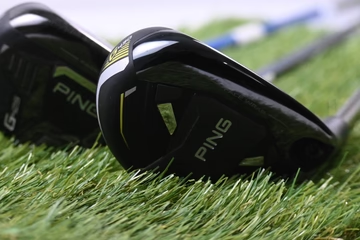A very warm welcome to the latest edition of the Ace Series, where we take a deep dive into the history, design and evolution of each type of golf club. This time, we shine our spotlight on hybrids and utilities - one of the most useful and versatile clubs in your golf bag.
But firstly, let’s address the question that we’ve been asked over and over again.


The Ace Series: Your complete, in-depth guide to hybrids and utilities
Are golf hybrids and utilities the same thing? And what about rescue clubs?
Yes! Hybrid golf clubs and utility golf clubs are exactly the same thing. And just to confuse matters further, they can also be known as ‘rescue clubs’ too. In this article, and across our site we tend to call them ‘hybrids’ or ‘utilities’, but you can call them whatever you like!
Hybrids… utilities… rescues… whatever you want to call them, start your search here!
Looking for a new hybrid? Browse our latest stock below.


Taylormade Qi35 #3 Hybrid / 19 Degree / Stiff Flex Fujikura Ventus Blue 7 Shaft


Taylormade Qi35 #4 Hybrid / 23 Degree / Regular Flex Fujikura Ventus Blue 6


Titleist GT3 #3 Hybrid / 19 Degree / Stiff Flex Tensei 1K Blue 65 Shaft


Taylormade Qi35 #4 Hybrid / 22 Degree / Regular Flex Fujikura Ventus Blue 6


Titleist GT3 #3 Hybrid / 19 Degree / Stiff Flex HZRDUS Black 80 Shaft


Titleist GT2 #4 Hybrid / 21 Degree / Regular Flex Tensei 1K Blue 65 Shaft


Titleist GT1 #5 Hybrid / 23 Degree / Regular Flex Fujikura Airspeeder 50 Shaft


Titleist GT2 #4 Hybrid / 21 Degree / Regular Flex Tensei 1K Blue 65 Shaft
The absolute basics of a hybrid golf club
A hybrid golf club exists to bridge the gap between a wood and an iron, offering the best of both worlds in terms of length, design and features. Since hybrids arrived on the market, they have almost completely negated the need to carry the lower-numbered irons (e.g. 1, 2 and 3-irons). It’s safe to say that pretty much every golfer these days will carry at least one hybrid in their golf bag.

The complete history of hybrids
Arriving in the early 2000s, the hybrid golf club is a relatively new kid on the block when it comes to golf equipment. But if you think it’s just a passing trend, think again – the hybrid is here to stay. The golf brand which first introduced the hybrid is debatable depending on who you speak to, but it’s fairly widely accepted that TaylorMade was an initial pioneer with its Rescue Mid. The popularity of this new type of golf club took off, creating plenty of demand and an opportunity for the category to be expanded. These days, every golf brand has a hybrid/utility offering.
In 2004, Todd Hamilton won the Open using his hybrid for around half of the shots that he took. He even used it for chipping the ball from a patch of long grass onto the green, when he wasn’t able to putt.
What’s the main purpose of a hybrid golf club?
A hybrid golf club offers the best of both worlds between woods and irons, combining their features. It was created as a blend of the two more traditional categories of clubs - woods (meaning anything that was historically made out of wood like persimmon, i.e., drivers or fairways, with a more bulbous head), and irons (metal clubs with a smaller clubhead).
Hybrids offer the golfer more margin for error, more forgiveness, and a lower, deeper Centre of Gravity (CoG), so it’s easy to see why they are as ubiquitous on the course as they are. The low CoG comes from the fact that the clubhead is not as large or bulbous as a driver or fairway, but it’s still larger in geometry than an iron. This allows more mass to be positioned around the perimeter of the clubhead, enabling you to hit the ball higher. The ball then tends to descend from a steeper height, landing on the green more softly. So it’s great for accuracy too.

How to use a hybrid

As the name suggests, the hybrid is a pretty versatile club, and golfers might opt to use their hybrid off the tee, from the fairway or from the rough. They are commonly a preferred alternative to a longer iron (a lower-numbered, lower-lofted iron… and you can learn more about loft in our guide to loft and lie). In terms of technique, it’s an easy club to adopt and there’s no need for a huge change in your stance or swing.
When it comes to the rules of golf around how many (or how few) hybrids you can carry, there are no rules. As long as you stick to the upper limit of 14 golf clubs in your bag, you can carry what you like. So in theory, you could carry 13 hybrids and a putter (but that might be a little extreme!). Check out our guide to the three most important clubs to carry in your bag to find out more about this.
If you’re willing to compromise on distance to gain more accuracy and control, then a utility is a great choice. A general rule of thumb is that golfers should always consider their ability to hit the ball straight first. The temptation, especially with novice golfers, is to hit the ball as far as possible, but your game will improve far more quickly if you focus on accuracy. If your accuracy isn’t great (which it often isn't with amateur golfers), go for a utility which will give you a far better result.
When it comes to irons versus hybrids, this is a choice that’s entirely dependent on your ability and handicap. An amateur will almost always get better results with a hybrid than with an iron. The same holds true for average handicappers, so if you’re faced with the dilemma of using a hybrid or an iron, then unless you’re a professional golfer it’s the hybrid that wins every time.
Choosing a hybrid to suit different abilities
We always recommend that every golfer carries at least one hybrid, because they offer so much ease of use and versatility compared to more traditional designs of irons and woods. Here’s what to consider when choosing your hybrid, based on your current skill level.
Hybrids for beginner golfers

If you’re a novice, then we recommend that you carry a few hybrids. That’s because they’ve been designed with maximum margin for error and ease of use, and trust us when we say that they will make your life much easier. They’re so popular that we have a handful of iron sets on offer that have been re-engineered as hybrid sets. These are really popular, and are a best-seller at golfclubs4cash. In these sets, every club from the 3 or 4 has been replaced by the equivalent utility, even down to the pitching wedge. You can also find composite sets that are made up of a mixture of utilities and traditional irons, and you’ll find individual hybrids/utilities available to buy too.
If you’re a beginner and want to experiment with some affordable but effective second-hand hybrid clubs, then we recommend the Cleveland Launcher HB iron set. They are a very popular choice with many of our customers who are new to the game.
Hybrids for intermediate and advanced golfers
The most popular hybrids carried by professional golfers are:
- 2 Hybrid (replacing a 5-wood): 16-18 degrees of loft
- 3 Hybrid (replacing a 3-iron: 19 degrees of loft
- 4 Hybrid (replacing a 4-iron: 22 degrees of loft
The technical aspects of a hybrid club
Hybrid golf clubs are typically cast or constructed from multiple pieces, so it’s usually a cast body with a forged face, and never a single-piece forging. The clubhead is constructed from steel, and this will be coupled with steel or graphite shafts depending on the ability of the golfer they’re targeting.
Golf hybrid adjustability in more detail

Hybrid shaft material and flex
Considerations for the shaft and flex of hybrid golf clubs are the same as for any other golf club, and you can read more about this in our Ace Series for drivers. In essence, golfers with faster swing speeds will typically choose a stiffer flex, and those with slower swing speeds will need more flex. Like other clubs, hybrid shafts are generally made from either steel or graphite.


Project X Cypher 2.0 50 #6 Hybrid Shaft / Senior Flex / Callaway 4th Gen


Project X Cypher 2.0 50 #6 Hybrid Shaft / Senior Flex / Callaway 3rd Gen


Project X Cypher 2.0 50 #5 Hybrid Shaft / Senior Flex / Callaway 3rd Gen


Project X Cypher 2.0 60 #4 Hybrid Shaft / Regular Flex / Callaway 4th Gen


Project X Cypher 2.0 70 #5 Hybrid Shaft / Stiff Flex / Callaway 3rd Gen


Fujikura Ventus TR Blue 7 #4 Hybrid Shaft / Regular Flex / Srixon


Project X Hzrdus Smoke Red RDX 70 #2 Hybrid Shaft / Regular Flex / Srixon


Project X Hzrdus Smoke Red RDX 70 #3 Hybrid / Senior Flex / Srixon
How much should I spend on a hybrid golf club?
Just like when you’re shopping for other golf clubs, you always get what you pay for. But the beauty of buying used golf clubs is that you can bag yourself a really great spec of golf club for a fraction of the price of a new one. And if it’s not right for you, you can simply trade it in for another model.
The key consideration when you’re buying second-hand hybrids online is that you pay attention to the condition of the club. This is the biggest clue you’ll get as to how much use the club has already had. Check out the full spec of the utility you are considering, and make sure you’re selecting the right loft and length etc. for you. At golfclubs4cash we are fully transparent with our condition grading and our customers trust us to supply them with golf clubs that are in the condition that they’re advertised. You can learn more about what we look for when appraising the condition of a golf club in our condition rating guide.
Which are the leading hybrid brands?
Almost every brand offers some kind of utility as part of its portfolio, and you’re bound to have brands that you prefer over others, so it’s very much a personal choice. Leaders in the hybrid market tend to be the usual category-leading brands, e.g. Callaway, TaylorMade, PING and Titleist. But we’d always encourage you to experiment with other brands as well.
More resources
If you’re interested in treating yourself to a second-hand golf hybrid, then you’ll find our buyers’ guide to hybrids/utilities a useful place to start. You’ll also love our list of best-selling golf hybrids/utilities at golfclubs4cash. Or browse our full range of hybrid golf clubs to help you choose.









